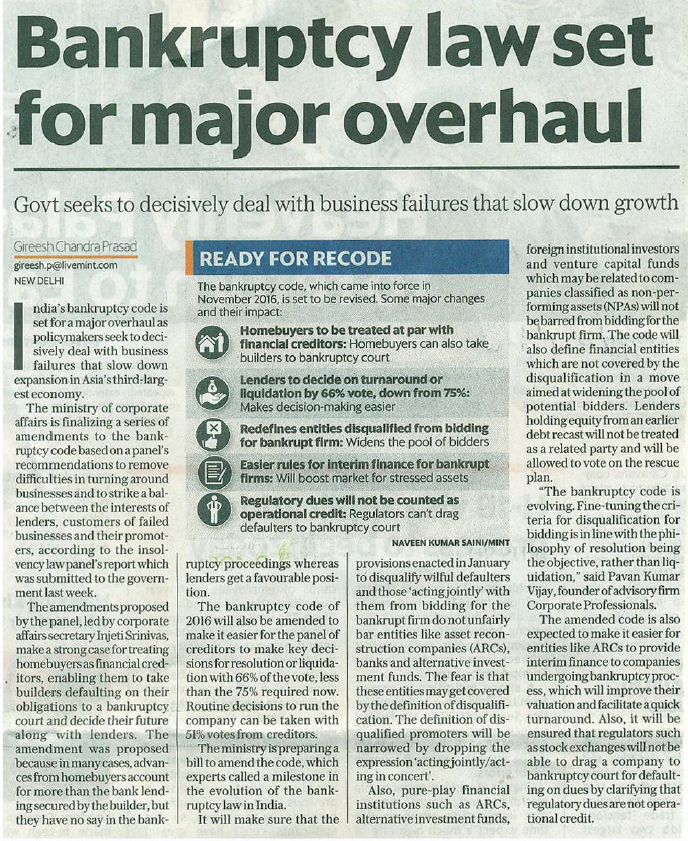
India’s bankruptcy law, the Insolvency and Bankruptcy Code (IBC), is set for a major overhaul as policymakers seek to decisively deal with business failures that slow down expansion in Asia’s third-largest economy.
The ministry of corporate affairs is finalizing a series of IBC amendments based on a panel’s recommendations to remove difficulties in turning around businesses and to strike a balance between the interests of lenders, customers of failed businesses and their promoters, according to the insolvency law panel’s report which was submitted to the government last week.
The IBC amendments proposed by the panel, led by corporate affairs secretary Injeti Srinivas, make a strong case for treating homebuyers as financial creditors, enabling them to take builders defaulting on their obligations to a bankruptcy court and decide their future along with lenders. The amendment was proposed because in many cases, advances from homebuyers account for more than the bank lending secured by the builder, but homebuyers have no say in the bankruptcy proceedings whereas lenders get a favourable position.
The bankruptcy code of 2016 will also be amended to make it easier for the panel of creditors to make key decisions for resolution or liquidation with 66% of the vote, less than the 75% required now. Routine decisions to run the company can be taken with 51% votes from creditors.
The ministry is preparing a bill to amend IBC, which experts called a milestone in the evolution of the bankruptcy law in India. It will make sure that the provisions enacted in January to disqualify wilful defaulters and those ‘acting jointly’ with them from bidding for the bankrupt firm do not unfairly bar entities like asset reconstruction companies (ARCs), banks and alternative investment funds. The fear is that these entities may get covered by the definition of disqualification. The definition of disqualified promoters will be narrowed by dropping the expression “acting jointly/acting in concert”.
Also, pure-play financial institutions such as ARCs, alternative investment funds, foreign institutional investors and venture capital funds which may be related to companies classified as non-performing assets (NPAs) will not be barred from bidding for the bankrupt firm. The code will also define financial entities which are not covered by the disqualification in a move aimed at widening the pool of potential bidders. Lenders holding equity from an earlier debt recast will not be treated as a related party and will be allowed to vote on the rescue plan.
“The bankruptcy code is evolving. Fine-tuning the criteria for disqualification for bidding is in line with the philosophy of resolution being the objective, rather than liquidation,” said Pavan Kumar Vijay, founder of advisory firm Corporate Professionals.
The amended code is also expected to make it easier for entities like ARCs to provide interim finance to companies undergoing bankruptcy process, which will improve their valuation and facilitate a quick turnaround. Also, it will be ensured that regulators such as stock exchanges will not be able to drag a company to bankruptcy court for defaulting on dues by clarifying that regulatory dues are not operational credit.
The IBC amendments, which will apply prospectively once enacted, will also clarify that lenders’ action against any guarantor to a bankrupt firm do not enjoy the same protection from recovery proceedings that the insolvent company enjoys while a rescue plan is prepared.
The idea is to prevent many promoters, who personally stand as guarantors to their companies, from abusing the moratorium on recovery allowed under the law. The proposed amendments will also make sure that companies filing for bankruptcy have to notify their banks and suppliers of their decision.

